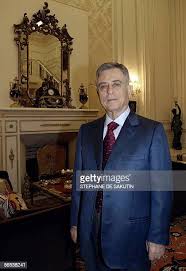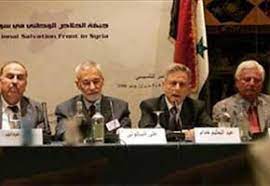The former Syrian Vice President, Abdel Halim Khaddam, described President Bashar al-Assad as: “emotional” and: “a teenager,” during an interview with the Lebanese Al-Mustaqbal station last night.
This came after the Lebanese Al-Mustaqbal station paid remarkable attention to her interview with the former Syrian Vice President on the “Al-Mahit” program, which can be seen through the successive announcement of the timing of the program’s broadcast, and the topics covered in the dialogue, in which the situation of the Lebanese-Israeli war is presented. , on the following topics, related to the internal situation in Syria, so that this constitutes, for many Syrian followers, an umbrella for talking about the internal situation in Syria, which is what concerns Al-Mustaqbal station, the satellite channel that most represents the Lebanese March 14 team, in addition to the “LBS” station.
Khaddam’s comment on Syrian President Bashar al-Assad’s speech is the most important topic for the station, and perhaps also for the Syrian viewers, who have been waiting for what Khaddam would say and what information he would bring to them, and he has continued to broadcast media campaigns against the Syrian regime since his departure. The country, and he represented part of the pillars of the regime for more than thirty years
Regarding the positions of the Lebanese parties regarding the war, and the possibilities of it moving inside Lebanon, Khaddam said: “When the war started, most of the Lebanese parties were not satisfied with it, but when the aggression occurred, the Lebanese people showed solidarity,” and he added: “The real guarantee that there will not be an upcoming round of war is National unity and recognition of the state as a decision maker.”
Khaddam, and in answer to the most prominent question: “Why did Syria not intervene militarily in the war?” Khaddam considered that after the repercussions of the 1973 war, that: “The classic war between Syria and Israel has ended,” and later: “The Syrian decision was taken by the Syrian president.” “The late Hafez al-Assad, who drained Israel from Lebanon,” he added, saying: “President Hafez al-Assad gave a decision not to carry out any operations through the Golan,” adding: “Southern Lebanon was part of the Syrian strategy to put pressure on Lebanon.” Regarding the current moment, Khaddam said “The Syrian President fears that the war will develop into Syria.”
He also said that the current circumstance differs from the circumstances during the era of President Hafez al-Assad, considering that: “The war has occurred,” indicating that Syria had to enter it, and it is impossible for Syria not to enter the war in a country exhausted by corruption and tyranny, and cannot bear the war. Khaddam directed his question to President Bashar al-Assad: “Why did you not participate and liberate the Golan?”
Returning to President Bashar al-Assad’s speech, where President al-Assad described Arab leaders as half-hearted men, Khaddam commented: “President al-Assad does not have a political strategy,” and that: “he wanted to take a revolutionary leap to cover up internal problems,” describing President al-Assad as: “emotional.” And his speech: “The speech of a teenage high school student,” adding the statement, commenting on Al-Assad’s last speech: “President Al-Assad made a mistake in his campaign against the Arab leaders.”
In addition, when the talk came about the internal situation in Syria, Khaddam repeated his previous positions, targeting a group of people close to the Syrian president, including Rami Makhlouf, and the phone contracts Al-Khaliwi, to say: “If the country was plundered, how would the steadfastness be?” Then he moved on to other topics, including the issue of the Kurds in Syria, and their circumstances today, considering that they are in a state of: “isolation and oppression,” and that they are: “part of Syrian society, but Persecuted
Khaddam, in response to accusations directed at Syrian opposition figures linked to American intelligence, had responded by accusing the Syrian regime of cooperating with American intelligence, accusing the regime of handing over the half-brother of the former Iraqi president, “Sabaawi,” to American intelligence, so Khaddam asked, directing his question to the regime. “Why did you put your intelligence at the disposal of American intelligence?” Continuing to talk about the Syrian opposition, Khaddam said: “President al-Assad does not know the Alawite sect, and that the Alawite sect was the most affected by the regime,” adding, and commenting on the reality of the Baath rule of the country: “The party It is taken as a cover for the authority,” and: “The partisans are the most harmed by the authority,” and: “The Baath Party does not rule.”
Regarding his personal role in Syrian-Lebanese relations, and what they led to, Khaddam said that he was: “ready to admit his mistakes and the mistakes of others in Lebanon,” and that he was: “ready to hold a special program about Lebanon,” adding that “he did not represent the decision... he represented part of the The decision “and that the decision was of two types: “a security decision and a political decision,” and that he was responsible for: “the political decision, not the security decision,” referring the security decision to the late minister, and the person responsible for the Syrian security file in Lebanon: “Ghazi Kanaan.”
In another context, and regarding Lebanese-Syrian issues, including the exchange of diplomatic relations, the demarcation of the borders, and the Shebaa Farms, Khaddam said: “The borders can be demarcated in the Shebaa Farms, and the Shebaa Farms is a pretext.”
In answer to the question: What does Syria want from Lebanon? Khaddam replied: “The Syrian regime has two goals in Lebanon. The first goal is to drag Lebanon into internal strife in order to close the investigation file into the assassination of Prime Minister Rafik Hariri.” As for the second, Khaddam considered that the Syrian regime has an interest in continuing to plunder Lebanon, and about the Syrian president’s accusation of a group March 14 that they are the May 17 Agreement group. Khaddam said: “Those who dropped the May 17 Agreement are three, coming in order: first, Walid Jumblatt, second, Nabih Berri, and third, Rafik Hariri,” adding that: “Nabih Berri is threatened by the Syrian regime,” and accuses Syria of killing the president. Rafik Hariri, and in his comment on the international investigation regarding the file of President Hariri’s murder, Khaddam said: “Assad’s concern expresses the feelings of those who committed the crime and fear that it will be exposed,” and added: “The investigation will include President Assad.”
In addition, regarding the issue of Lebanese detainees in Syrian prisons, Khaddam had denied knowledge of the truth and extent of this file, stressing that he had no information about it.



